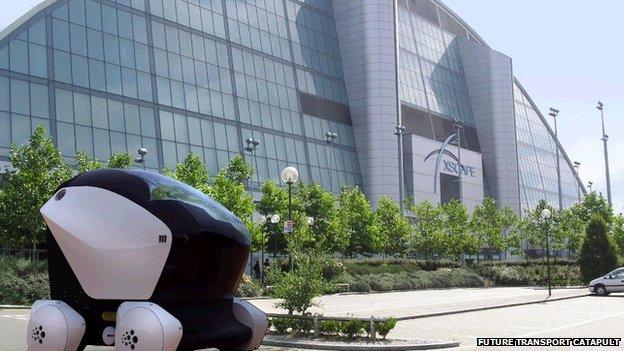Tomorrow's cities - How do cities get smarter?
- Published
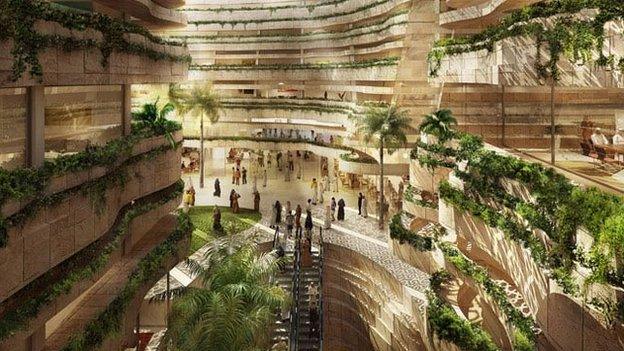
Masdar in the the United Arab Emirates aims to be carbon neutral
Mention "smart cities" to people and the first questions they ask are: "What is a smart city?" and "Where is the smartest one?"
Unfortunately neither are particularly easy to answer. Smart means different things to different cities. For some, it may be finding ways to relieve pollution or congestion - using sensors and data analysis. For others, it is more about finding ways to make cities greener - with bike-sharing schemes or more parks.
Some cities have been built with smartness in mind, such as Songdo in South Korea, which has hi-tech plumbed into its infrastructure, or green city Masdar in the United Arab Emirates.
Even cities in some of the least technically advanced areas of the world have aspects of smartness, whether it be the plan to monitor urbanisation in Dar es Salaam with apps such as OpenStreetMap, or the smart slum being developed in Stellenbosch, outside Cape Town, which is powering homes with roof-mounted solar panels and allowing people to purchase electricity though their mobile phones.
The UK is keen not only to build smarter cities but to become a world leader in smart-city technology.
In order to kick-start its smart-city programme, the government ran a competition last year and the winner, Glasgow, was given £24m to spend on smart technologies.
So is Glasgow a shining example of how to do things well?
Currently basking the glory of hosting the Commonwealth Games, Glasgow also has its share of social problems - not least the fact that it has the lowest life-expectancy of any city in the UK.
Some of the money may go on using big data to solve what is known as the Glasgow question - the conundrum that within a seven-mile radius of the city life-expectancy drops by 28 years.
Some may go on helping improve energy efficiency in areas of the city where people spend large amounts of their household income on fuel, or to provide dynamic routing for public transport in areas of the city currently poorly served.
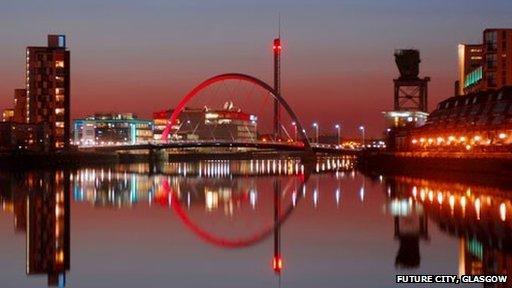
Is Glasgow one of the world's smartest cities?
Half of the money has already been spent on building an operation centre - rather like an existing one in Rio de Janeiro - a room filled with screens monitored by the police, traffic authorities and emergency services.
Helping to solve crime is very important to a city that has more than its fair share of anti-social behaviour.
It has upgraded its CCTV system with 400 high-resolution cameras and plans to plough money into research around how big data can be used to predict crime.
It is also investing in intelligent lighting that, as well as helping cut the city's large energy bill, will be linked to security cameras to light up areas in which trouble is breaking out.
It wants to use some of the money to open up a range of city data that people can access via an online dashboard and has created a MyGlasgow smartphone app that allows residents to report problems such as uncollected bin and potholes.
But its move towards smartness hasn't been a smooth one.
Earlier this summer, five of the executives on the board set up to oversee its smart city plans were sacked with little explanation.
One source familiar with the matter, who wishes to remain anonymous, told the BBC what had happened.
"The team wanted to set up a new company that would take some of the know-how and good practice developed in Glasgow and let others cities benefit.
"Within weeks of the news that they had won a contract to set up this new company after its contract with Glasgow ended, they were asked to clear their desks and get out of the building."
So why was Glasgow city council so against sharing its plans with others?
"Glasgow has its own political way of doing things. It has a strong Labour-led council and perhaps was less comfortable with a private company using their know-how for private gain," the source suggested
Not perhaps a great start for the vision of sharing smart cities expertise on a global market. And when the BBC asked for an interview with the current smart city team, the council refused to make any comment at all.
Playable city
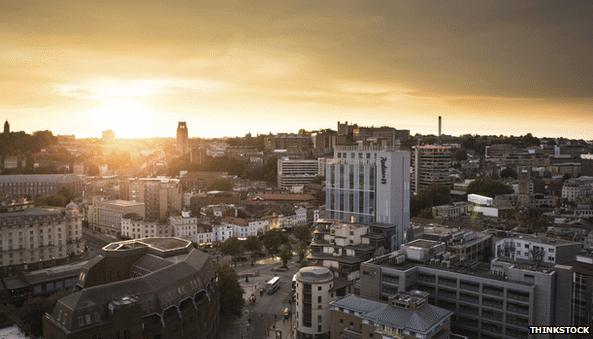
Bristol has taken a different approach to being smart
By contrast, Bristol, a city some 600km (370 miles) away, down the west coast of England, was more than happy to talk about its plans.
"We won the £3m runner-up prize so were less pressurised in how we could spend it," said head of Bristol Futures, Stephen Hilton.
"Control centres are important, but the focus in Bristol is on people and experiences," he added, with just a small dig at his northern counterpart.
It plans, like many other cities, to open up a wealth of government data that can be turned into useful apps and services.
It has already spawned some neat little apps, such as HillsAreEvil, which sets out to provide accessible routes around the city - offering those in wheelchairs or with other mobility issues information about where to find areas with the most drop-kerbs, least cobbles or hills.
The council is also not shying away from opening up what some may regard as sensitive data from its food-premises inspections.
"People will be able to see in real-time restaurant and cafe ratings," said Mr Hilton.
And Bristol measures well on the green agenda. The council has its own renewable energy company, and investment from the European Investment Bank has helped it set up wind turbines and retrofit 28,000 units of social housing with solar panels and smart meters
As a result of that and other initiatives, it has won the prestigious title of European Green Capital in 2015.
Bristol council is also in the unusual position of owning a network of ducts that run under the city and has been busy installing fibre to link up schools, community centres and local businesses. Now it wants to invite hi-tech companies to use the network to develop technologies that require huge amounts of bandwidth.
"We are basically challenging them to try and break the network," said Mr Hilton. It is all part of a plan to turn the city into a "living lab".
Shadow land
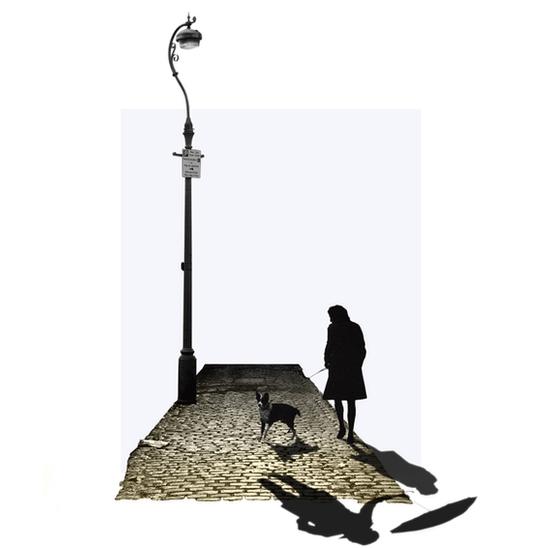
Shadowing is a project that plays with the idea of identity and community
But perhaps one of the most interesting aspects of Bristol's smartness is an acknowledgement that, if it is going to resonate with citizens, there needs to be a fun element to its plans.
"It shouldn't all be about optimising efficiency because that can sometimes look dull," said Mr Hilton.
Clare Reddington couldn't agree more. As head of Bristol's Pervasive Media Studio, she heads up the Playable Cities Awards, as a deliberate counterpoint to the idea that a smart city is all about efficiency.

"We want to make cities feel more hospitable. That drive to efficiency doesn't often think about people and their connections," she said.
This year's winner, Shadowing, is all about hacking street lights in some of the more deprived areas of the city.
"Shadowing offers passers-by a trace of those who have walked the same path moments, days or weeks before, like ghostly time travellers or imaginary friends," she explained.
"It offers an exploration of the disconnectedness that technology can create between strangers, the role of light in shaping a city's character, and the unseen data and surveillance culture that pervades today's urban spaces."
There is no blueprint for smartness. Some cities will choose control centres, others art installations but all should perhaps bear in mind a question posed by playwright Shakespeare, writing at a time when urbanisation was in its infancy: "What is a city but its people?"
- Published16 October 2014

- Published9 October 2014

- Published2 October 2014
